FND002 Project Proposal: Total Quality Management at Tesco
VerifiedAdded on 2022/11/28
|14
|3020
|500
Project
AI Summary
This project proposal investigates the impact of Total Quality Management (TQM) practices on customer retention and satisfaction at Tesco Plc. The introduction outlines the background, aims, objectives, and research questions, emphasizing the importance of TQM in enhancing customer loyalty and satisfaction within the retail sector. The literature review explores existing research on TQM, its methods, and its effects on customer satisfaction. The methodology section details the qualitative research approach, including research type, philosophy, sampling, data collection, and analysis methods, such as thematic analysis. The proposed analysis section outlines the approach to analyzing the collected data to address the research questions and objectives, while the reflective essay provides insights gained from the module. The project uses a Gantt chart for planning, with references to support the research findings. The study aims to provide recommendations for Tesco to overcome challenges related to customer retention and satisfaction, ultimately improving its business outcomes.
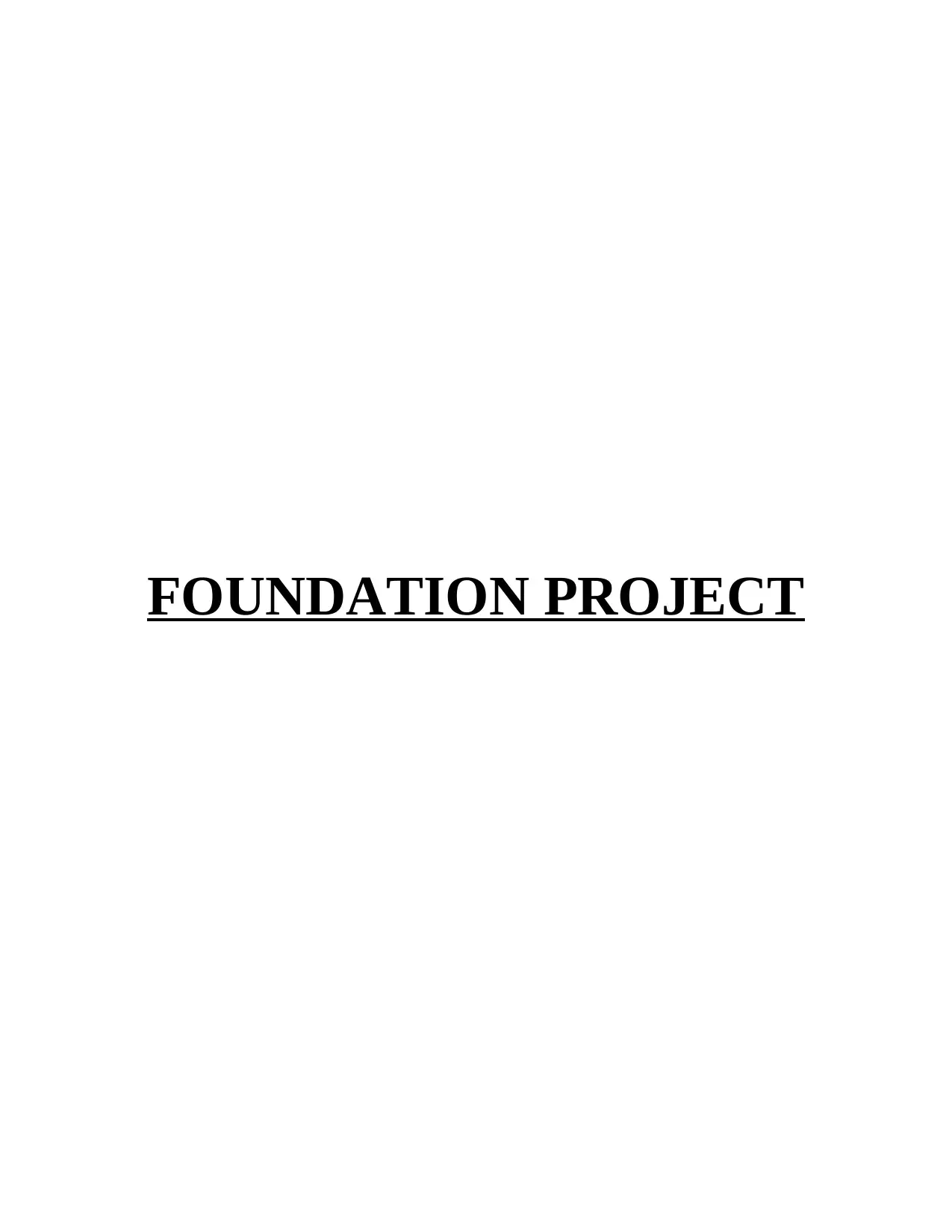
FOUNDATION PROJECT
Paraphrase This Document
Need a fresh take? Get an instant paraphrase of this document with our AI Paraphraser
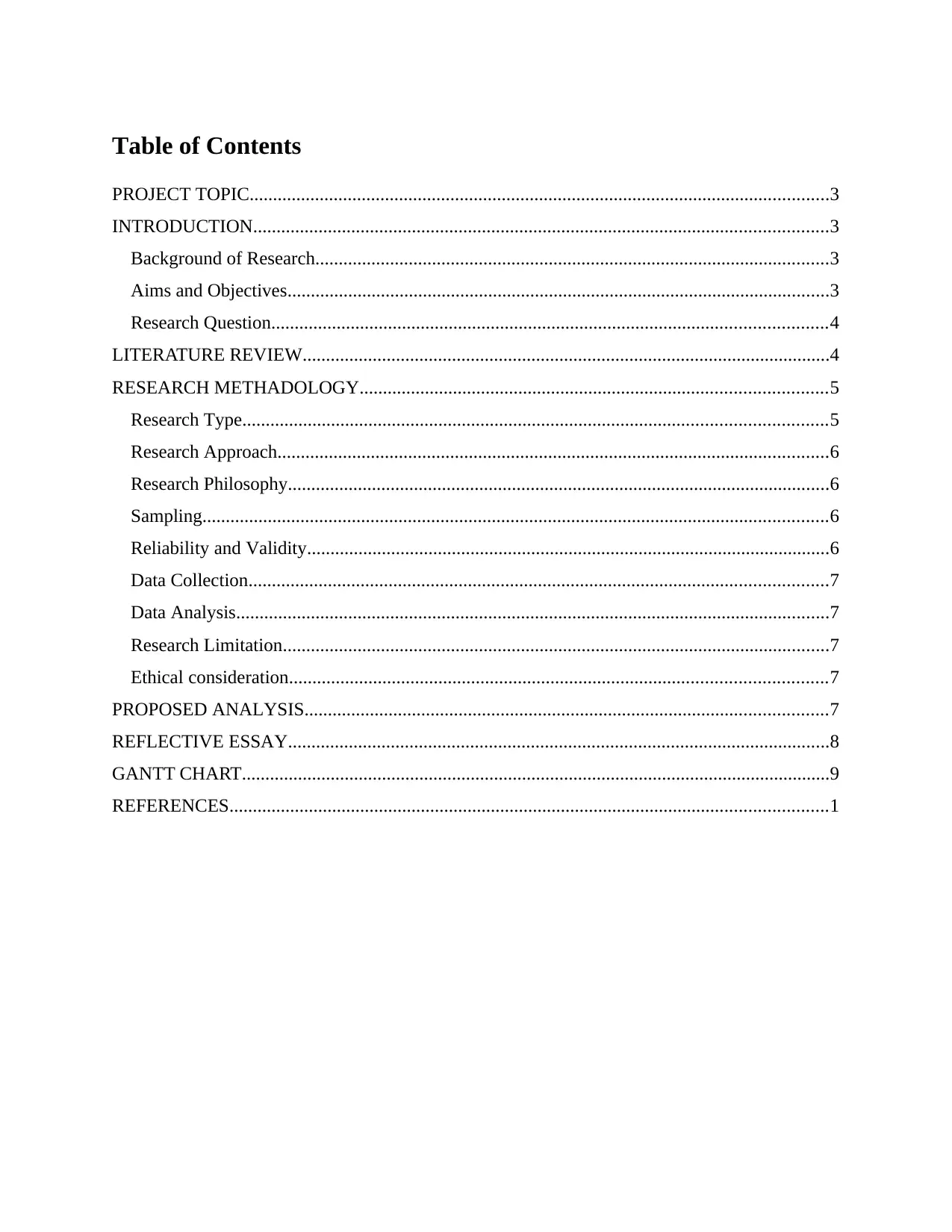
Table of Contents
PROJECT TOPIC............................................................................................................................3
INTRODUCTION...........................................................................................................................3
Background of Research..............................................................................................................3
Aims and Objectives....................................................................................................................3
Research Question.......................................................................................................................4
LITERATURE REVIEW.................................................................................................................4
RESEARCH METHADOLOGY....................................................................................................5
Research Type.............................................................................................................................5
Research Approach......................................................................................................................6
Research Philosophy....................................................................................................................6
Sampling......................................................................................................................................6
Reliability and Validity................................................................................................................6
Data Collection............................................................................................................................7
Data Analysis...............................................................................................................................7
Research Limitation.....................................................................................................................7
Ethical consideration...................................................................................................................7
PROPOSED ANALYSIS................................................................................................................7
REFLECTIVE ESSAY....................................................................................................................8
GANTT CHART..............................................................................................................................9
REFERENCES................................................................................................................................1
PROJECT TOPIC............................................................................................................................3
INTRODUCTION...........................................................................................................................3
Background of Research..............................................................................................................3
Aims and Objectives....................................................................................................................3
Research Question.......................................................................................................................4
LITERATURE REVIEW.................................................................................................................4
RESEARCH METHADOLOGY....................................................................................................5
Research Type.............................................................................................................................5
Research Approach......................................................................................................................6
Research Philosophy....................................................................................................................6
Sampling......................................................................................................................................6
Reliability and Validity................................................................................................................6
Data Collection............................................................................................................................7
Data Analysis...............................................................................................................................7
Research Limitation.....................................................................................................................7
Ethical consideration...................................................................................................................7
PROPOSED ANALYSIS................................................................................................................7
REFLECTIVE ESSAY....................................................................................................................8
GANTT CHART..............................................................................................................................9
REFERENCES................................................................................................................................1
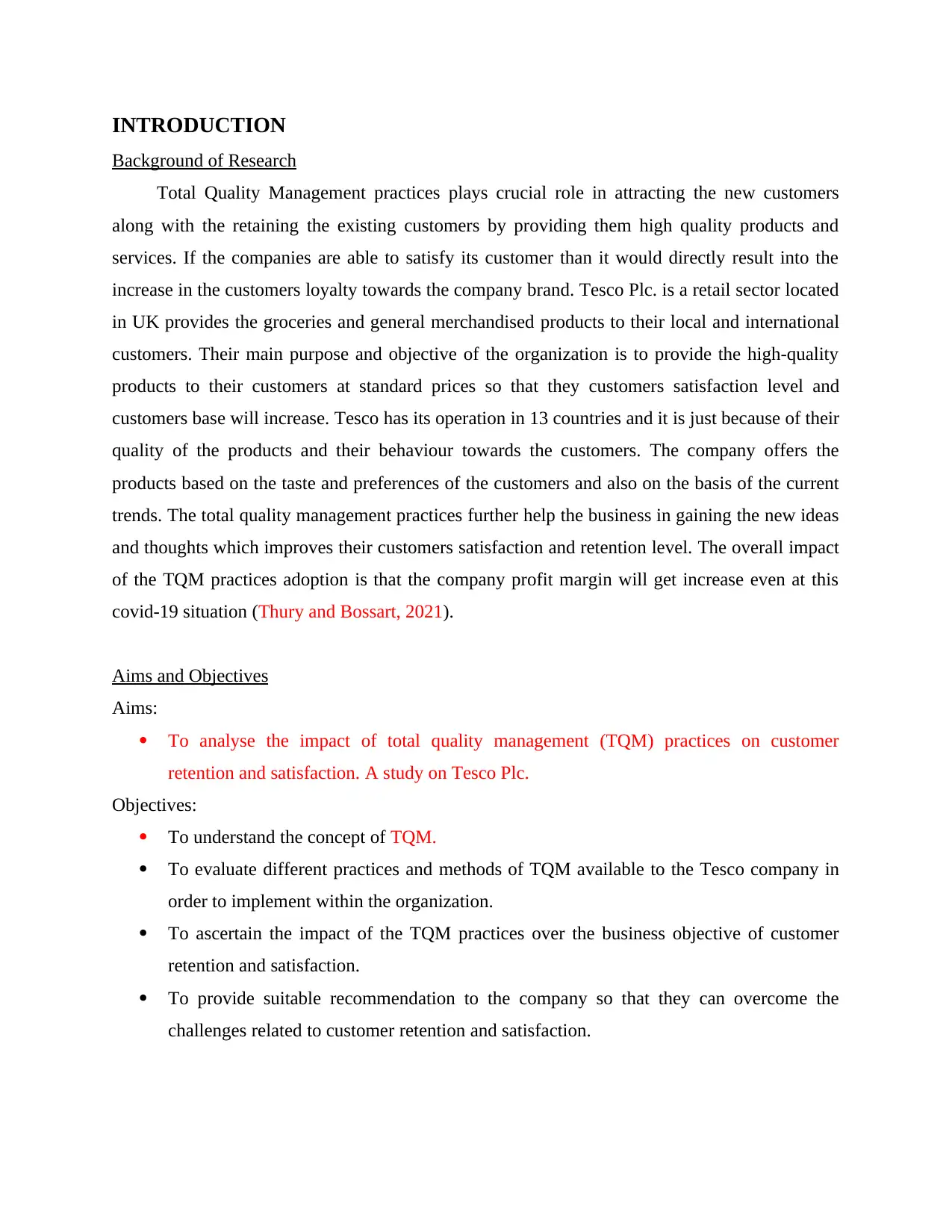
INTRODUCTION
Background of Research
Total Quality Management practices plays crucial role in attracting the new customers
along with the retaining the existing customers by providing them high quality products and
services. If the companies are able to satisfy its customer than it would directly result into the
increase in the customers loyalty towards the company brand. Tesco Plc. is a retail sector located
in UK provides the groceries and general merchandised products to their local and international
customers. Their main purpose and objective of the organization is to provide the high-quality
products to their customers at standard prices so that they customers satisfaction level and
customers base will increase. Tesco has its operation in 13 countries and it is just because of their
quality of the products and their behaviour towards the customers. The company offers the
products based on the taste and preferences of the customers and also on the basis of the current
trends. The total quality management practices further help the business in gaining the new ideas
and thoughts which improves their customers satisfaction and retention level. The overall impact
of the TQM practices adoption is that the company profit margin will get increase even at this
covid-19 situation (Thury and Bossart, 2021).
Aims and Objectives
Aims:
To analyse the impact of total quality management (TQM) practices on customer
retention and satisfaction. A study on Tesco Plc.
Objectives:
To understand the concept of TQM.
To evaluate different practices and methods of TQM available to the Tesco company in
order to implement within the organization.
To ascertain the impact of the TQM practices over the business objective of customer
retention and satisfaction.
To provide suitable recommendation to the company so that they can overcome the
challenges related to customer retention and satisfaction.
Background of Research
Total Quality Management practices plays crucial role in attracting the new customers
along with the retaining the existing customers by providing them high quality products and
services. If the companies are able to satisfy its customer than it would directly result into the
increase in the customers loyalty towards the company brand. Tesco Plc. is a retail sector located
in UK provides the groceries and general merchandised products to their local and international
customers. Their main purpose and objective of the organization is to provide the high-quality
products to their customers at standard prices so that they customers satisfaction level and
customers base will increase. Tesco has its operation in 13 countries and it is just because of their
quality of the products and their behaviour towards the customers. The company offers the
products based on the taste and preferences of the customers and also on the basis of the current
trends. The total quality management practices further help the business in gaining the new ideas
and thoughts which improves their customers satisfaction and retention level. The overall impact
of the TQM practices adoption is that the company profit margin will get increase even at this
covid-19 situation (Thury and Bossart, 2021).
Aims and Objectives
Aims:
To analyse the impact of total quality management (TQM) practices on customer
retention and satisfaction. A study on Tesco Plc.
Objectives:
To understand the concept of TQM.
To evaluate different practices and methods of TQM available to the Tesco company in
order to implement within the organization.
To ascertain the impact of the TQM practices over the business objective of customer
retention and satisfaction.
To provide suitable recommendation to the company so that they can overcome the
challenges related to customer retention and satisfaction.
⊘ This is a preview!⊘
Do you want full access?
Subscribe today to unlock all pages.

Trusted by 1+ million students worldwide
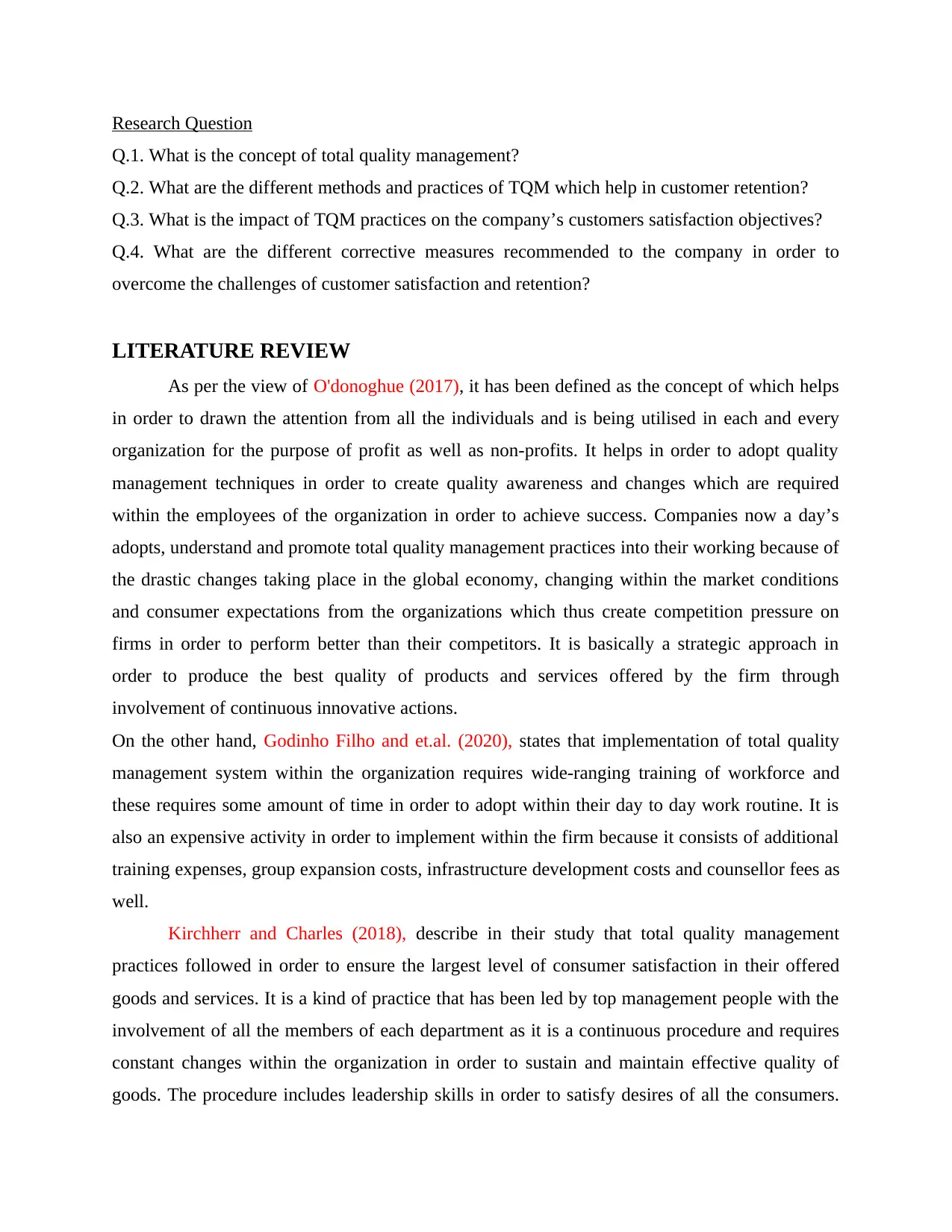
Research Question
Q.1. What is the concept of total quality management?
Q.2. What are the different methods and practices of TQM which help in customer retention?
Q.3. What is the impact of TQM practices on the company’s customers satisfaction objectives?
Q.4. What are the different corrective measures recommended to the company in order to
overcome the challenges of customer satisfaction and retention?
LITERATURE REVIEW
As per the view of O'donoghue (2017), it has been defined as the concept of which helps
in order to drawn the attention from all the individuals and is being utilised in each and every
organization for the purpose of profit as well as non-profits. It helps in order to adopt quality
management techniques in order to create quality awareness and changes which are required
within the employees of the organization in order to achieve success. Companies now a day’s
adopts, understand and promote total quality management practices into their working because of
the drastic changes taking place in the global economy, changing within the market conditions
and consumer expectations from the organizations which thus create competition pressure on
firms in order to perform better than their competitors. It is basically a strategic approach in
order to produce the best quality of products and services offered by the firm through
involvement of continuous innovative actions.
On the other hand, Godinho Filho and et.al. (2020), states that implementation of total quality
management system within the organization requires wide-ranging training of workforce and
these requires some amount of time in order to adopt within their day to day work routine. It is
also an expensive activity in order to implement within the firm because it consists of additional
training expenses, group expansion costs, infrastructure development costs and counsellor fees as
well.
Kirchherr and Charles (2018), describe in their study that total quality management
practices followed in order to ensure the largest level of consumer satisfaction in their offered
goods and services. It is a kind of practice that has been led by top management people with the
involvement of all the members of each department as it is a continuous procedure and requires
constant changes within the organization in order to sustain and maintain effective quality of
goods. The procedure includes leadership skills in order to satisfy desires of all the consumers.
Q.1. What is the concept of total quality management?
Q.2. What are the different methods and practices of TQM which help in customer retention?
Q.3. What is the impact of TQM practices on the company’s customers satisfaction objectives?
Q.4. What are the different corrective measures recommended to the company in order to
overcome the challenges of customer satisfaction and retention?
LITERATURE REVIEW
As per the view of O'donoghue (2017), it has been defined as the concept of which helps
in order to drawn the attention from all the individuals and is being utilised in each and every
organization for the purpose of profit as well as non-profits. It helps in order to adopt quality
management techniques in order to create quality awareness and changes which are required
within the employees of the organization in order to achieve success. Companies now a day’s
adopts, understand and promote total quality management practices into their working because of
the drastic changes taking place in the global economy, changing within the market conditions
and consumer expectations from the organizations which thus create competition pressure on
firms in order to perform better than their competitors. It is basically a strategic approach in
order to produce the best quality of products and services offered by the firm through
involvement of continuous innovative actions.
On the other hand, Godinho Filho and et.al. (2020), states that implementation of total quality
management system within the organization requires wide-ranging training of workforce and
these requires some amount of time in order to adopt within their day to day work routine. It is
also an expensive activity in order to implement within the firm because it consists of additional
training expenses, group expansion costs, infrastructure development costs and counsellor fees as
well.
Kirchherr and Charles (2018), describe in their study that total quality management
practices followed in order to ensure the largest level of consumer satisfaction in their offered
goods and services. It is a kind of practice that has been led by top management people with the
involvement of all the members of each department as it is a continuous procedure and requires
constant changes within the organization in order to sustain and maintain effective quality of
goods. The procedure includes leadership skills in order to satisfy desires of all the consumers.
Paraphrase This Document
Need a fresh take? Get an instant paraphrase of this document with our AI Paraphraser
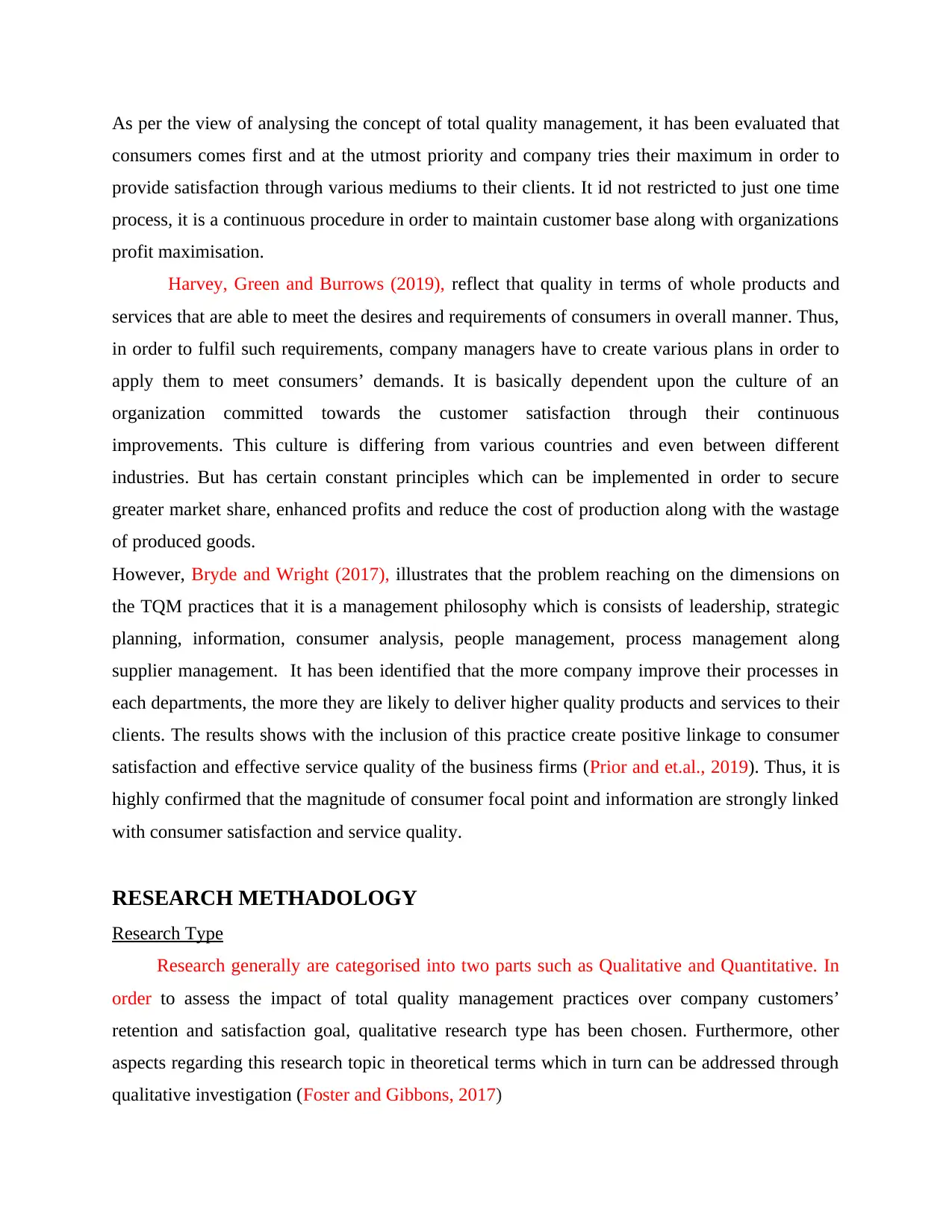
As per the view of analysing the concept of total quality management, it has been evaluated that
consumers comes first and at the utmost priority and company tries their maximum in order to
provide satisfaction through various mediums to their clients. It id not restricted to just one time
process, it is a continuous procedure in order to maintain customer base along with organizations
profit maximisation.
Harvey, Green and Burrows (2019), reflect that quality in terms of whole products and
services that are able to meet the desires and requirements of consumers in overall manner. Thus,
in order to fulfil such requirements, company managers have to create various plans in order to
apply them to meet consumers’ demands. It is basically dependent upon the culture of an
organization committed towards the customer satisfaction through their continuous
improvements. This culture is differing from various countries and even between different
industries. But has certain constant principles which can be implemented in order to secure
greater market share, enhanced profits and reduce the cost of production along with the wastage
of produced goods.
However, Bryde and Wright (2017), illustrates that the problem reaching on the dimensions on
the TQM practices that it is a management philosophy which is consists of leadership, strategic
planning, information, consumer analysis, people management, process management along
supplier management. It has been identified that the more company improve their processes in
each departments, the more they are likely to deliver higher quality products and services to their
clients. The results shows with the inclusion of this practice create positive linkage to consumer
satisfaction and effective service quality of the business firms (Prior and et.al., 2019). Thus, it is
highly confirmed that the magnitude of consumer focal point and information are strongly linked
with consumer satisfaction and service quality.
RESEARCH METHADOLOGY
Research Type
Research generally are categorised into two parts such as Qualitative and Quantitative. In
order to assess the impact of total quality management practices over company customers’
retention and satisfaction goal, qualitative research type has been chosen. Furthermore, other
aspects regarding this research topic in theoretical terms which in turn can be addressed through
qualitative investigation (Foster and Gibbons, 2017)
consumers comes first and at the utmost priority and company tries their maximum in order to
provide satisfaction through various mediums to their clients. It id not restricted to just one time
process, it is a continuous procedure in order to maintain customer base along with organizations
profit maximisation.
Harvey, Green and Burrows (2019), reflect that quality in terms of whole products and
services that are able to meet the desires and requirements of consumers in overall manner. Thus,
in order to fulfil such requirements, company managers have to create various plans in order to
apply them to meet consumers’ demands. It is basically dependent upon the culture of an
organization committed towards the customer satisfaction through their continuous
improvements. This culture is differing from various countries and even between different
industries. But has certain constant principles which can be implemented in order to secure
greater market share, enhanced profits and reduce the cost of production along with the wastage
of produced goods.
However, Bryde and Wright (2017), illustrates that the problem reaching on the dimensions on
the TQM practices that it is a management philosophy which is consists of leadership, strategic
planning, information, consumer analysis, people management, process management along
supplier management. It has been identified that the more company improve their processes in
each departments, the more they are likely to deliver higher quality products and services to their
clients. The results shows with the inclusion of this practice create positive linkage to consumer
satisfaction and effective service quality of the business firms (Prior and et.al., 2019). Thus, it is
highly confirmed that the magnitude of consumer focal point and information are strongly linked
with consumer satisfaction and service quality.
RESEARCH METHADOLOGY
Research Type
Research generally are categorised into two parts such as Qualitative and Quantitative. In
order to assess the impact of total quality management practices over company customers’
retention and satisfaction goal, qualitative research type has been chosen. Furthermore, other
aspects regarding this research topic in theoretical terms which in turn can be addressed through
qualitative investigation (Foster and Gibbons, 2017)
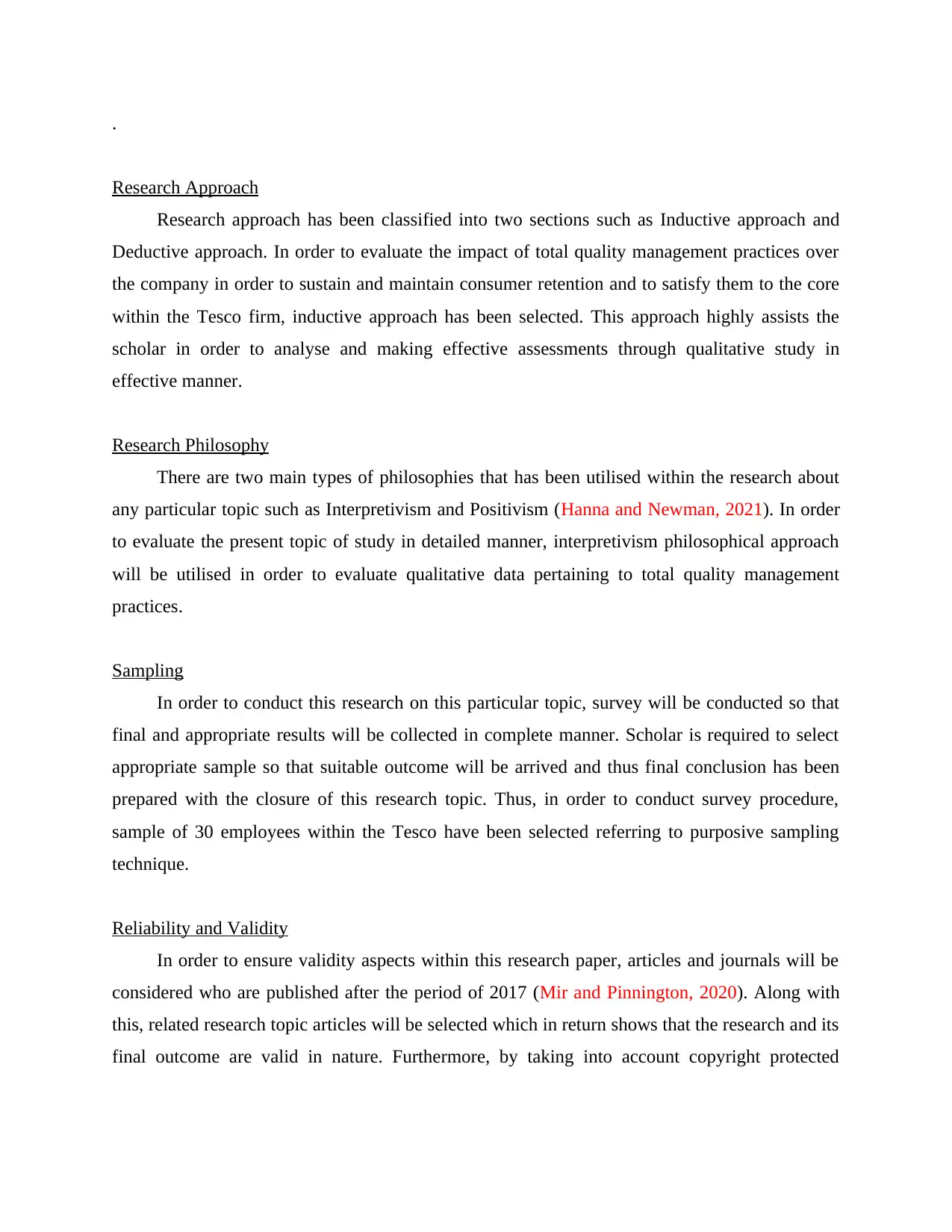
.
Research Approach
Research approach has been classified into two sections such as Inductive approach and
Deductive approach. In order to evaluate the impact of total quality management practices over
the company in order to sustain and maintain consumer retention and to satisfy them to the core
within the Tesco firm, inductive approach has been selected. This approach highly assists the
scholar in order to analyse and making effective assessments through qualitative study in
effective manner.
Research Philosophy
There are two main types of philosophies that has been utilised within the research about
any particular topic such as Interpretivism and Positivism (Hanna and Newman, 2021). In order
to evaluate the present topic of study in detailed manner, interpretivism philosophical approach
will be utilised in order to evaluate qualitative data pertaining to total quality management
practices.
Sampling
In order to conduct this research on this particular topic, survey will be conducted so that
final and appropriate results will be collected in complete manner. Scholar is required to select
appropriate sample so that suitable outcome will be arrived and thus final conclusion has been
prepared with the closure of this research topic. Thus, in order to conduct survey procedure,
sample of 30 employees within the Tesco have been selected referring to purposive sampling
technique.
Reliability and Validity
In order to ensure validity aspects within this research paper, articles and journals will be
considered who are published after the period of 2017 (Mir and Pinnington, 2020). Along with
this, related research topic articles will be selected which in return shows that the research and its
final outcome are valid in nature. Furthermore, by taking into account copyright protected
Research Approach
Research approach has been classified into two sections such as Inductive approach and
Deductive approach. In order to evaluate the impact of total quality management practices over
the company in order to sustain and maintain consumer retention and to satisfy them to the core
within the Tesco firm, inductive approach has been selected. This approach highly assists the
scholar in order to analyse and making effective assessments through qualitative study in
effective manner.
Research Philosophy
There are two main types of philosophies that has been utilised within the research about
any particular topic such as Interpretivism and Positivism (Hanna and Newman, 2021). In order
to evaluate the present topic of study in detailed manner, interpretivism philosophical approach
will be utilised in order to evaluate qualitative data pertaining to total quality management
practices.
Sampling
In order to conduct this research on this particular topic, survey will be conducted so that
final and appropriate results will be collected in complete manner. Scholar is required to select
appropriate sample so that suitable outcome will be arrived and thus final conclusion has been
prepared with the closure of this research topic. Thus, in order to conduct survey procedure,
sample of 30 employees within the Tesco have been selected referring to purposive sampling
technique.
Reliability and Validity
In order to ensure validity aspects within this research paper, articles and journals will be
considered who are published after the period of 2017 (Mir and Pinnington, 2020). Along with
this, related research topic articles will be selected which in return shows that the research and its
final outcome are valid in nature. Furthermore, by taking into account copyright protected
⊘ This is a preview!⊘
Do you want full access?
Subscribe today to unlock all pages.

Trusted by 1+ million students worldwide
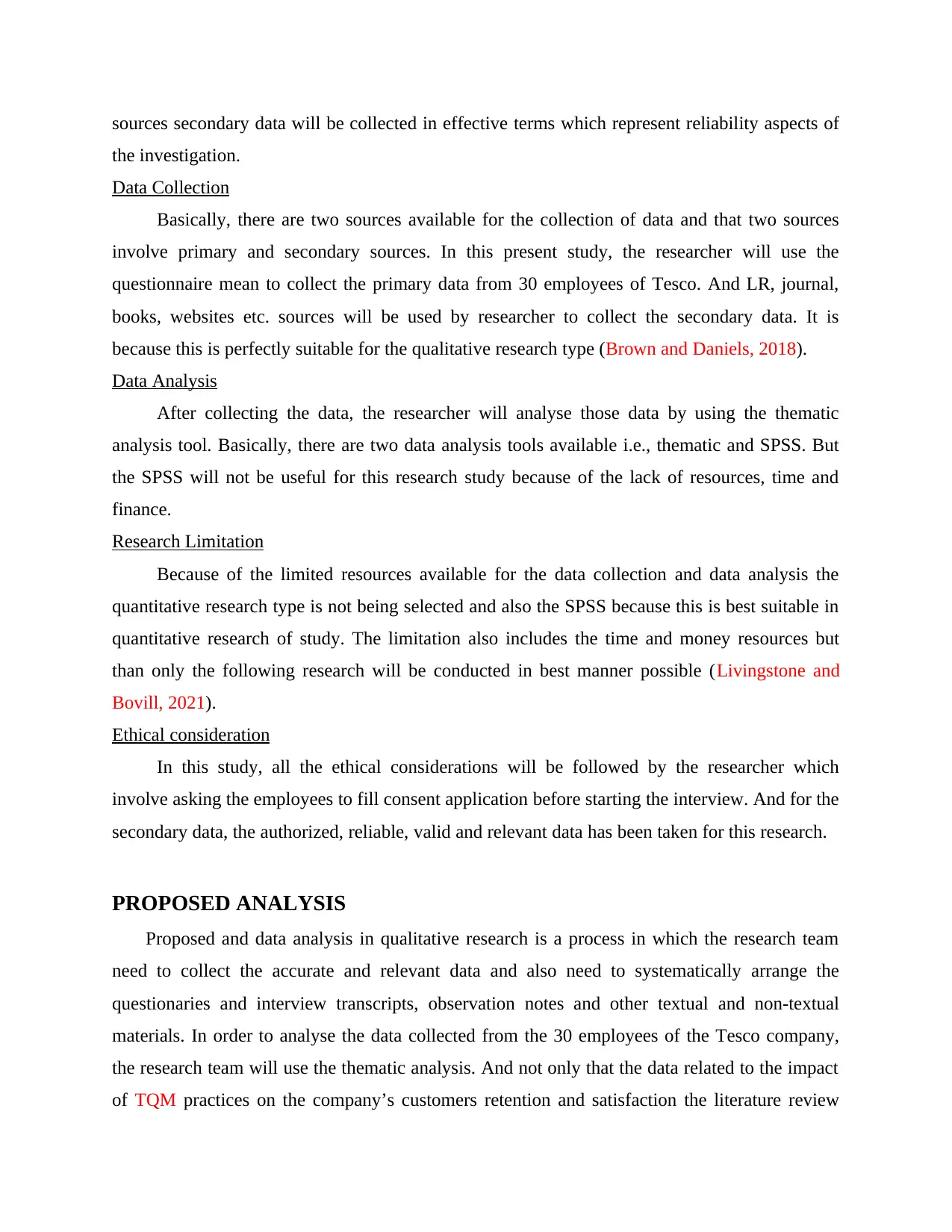
sources secondary data will be collected in effective terms which represent reliability aspects of
the investigation.
Data Collection
Basically, there are two sources available for the collection of data and that two sources
involve primary and secondary sources. In this present study, the researcher will use the
questionnaire mean to collect the primary data from 30 employees of Tesco. And LR, journal,
books, websites etc. sources will be used by researcher to collect the secondary data. It is
because this is perfectly suitable for the qualitative research type (Brown and Daniels, 2018).
Data Analysis
After collecting the data, the researcher will analyse those data by using the thematic
analysis tool. Basically, there are two data analysis tools available i.e., thematic and SPSS. But
the SPSS will not be useful for this research study because of the lack of resources, time and
finance.
Research Limitation
Because of the limited resources available for the data collection and data analysis the
quantitative research type is not being selected and also the SPSS because this is best suitable in
quantitative research of study. The limitation also includes the time and money resources but
than only the following research will be conducted in best manner possible (Livingstone and
Bovill, 2021).
Ethical consideration
In this study, all the ethical considerations will be followed by the researcher which
involve asking the employees to fill consent application before starting the interview. And for the
secondary data, the authorized, reliable, valid and relevant data has been taken for this research.
PROPOSED ANALYSIS
Proposed and data analysis in qualitative research is a process in which the research team
need to collect the accurate and relevant data and also need to systematically arrange the
questionaries and interview transcripts, observation notes and other textual and non-textual
materials. In order to analyse the data collected from the 30 employees of the Tesco company,
the research team will use the thematic analysis. And not only that the data related to the impact
of TQM practices on the company’s customers retention and satisfaction the literature review
the investigation.
Data Collection
Basically, there are two sources available for the collection of data and that two sources
involve primary and secondary sources. In this present study, the researcher will use the
questionnaire mean to collect the primary data from 30 employees of Tesco. And LR, journal,
books, websites etc. sources will be used by researcher to collect the secondary data. It is
because this is perfectly suitable for the qualitative research type (Brown and Daniels, 2018).
Data Analysis
After collecting the data, the researcher will analyse those data by using the thematic
analysis tool. Basically, there are two data analysis tools available i.e., thematic and SPSS. But
the SPSS will not be useful for this research study because of the lack of resources, time and
finance.
Research Limitation
Because of the limited resources available for the data collection and data analysis the
quantitative research type is not being selected and also the SPSS because this is best suitable in
quantitative research of study. The limitation also includes the time and money resources but
than only the following research will be conducted in best manner possible (Livingstone and
Bovill, 2021).
Ethical consideration
In this study, all the ethical considerations will be followed by the researcher which
involve asking the employees to fill consent application before starting the interview. And for the
secondary data, the authorized, reliable, valid and relevant data has been taken for this research.
PROPOSED ANALYSIS
Proposed and data analysis in qualitative research is a process in which the research team
need to collect the accurate and relevant data and also need to systematically arrange the
questionaries and interview transcripts, observation notes and other textual and non-textual
materials. In order to analyse the data collected from the 30 employees of the Tesco company,
the research team will use the thematic analysis. And not only that the data related to the impact
of TQM practices on the company’s customers retention and satisfaction the literature review
Paraphrase This Document
Need a fresh take? Get an instant paraphrase of this document with our AI Paraphraser
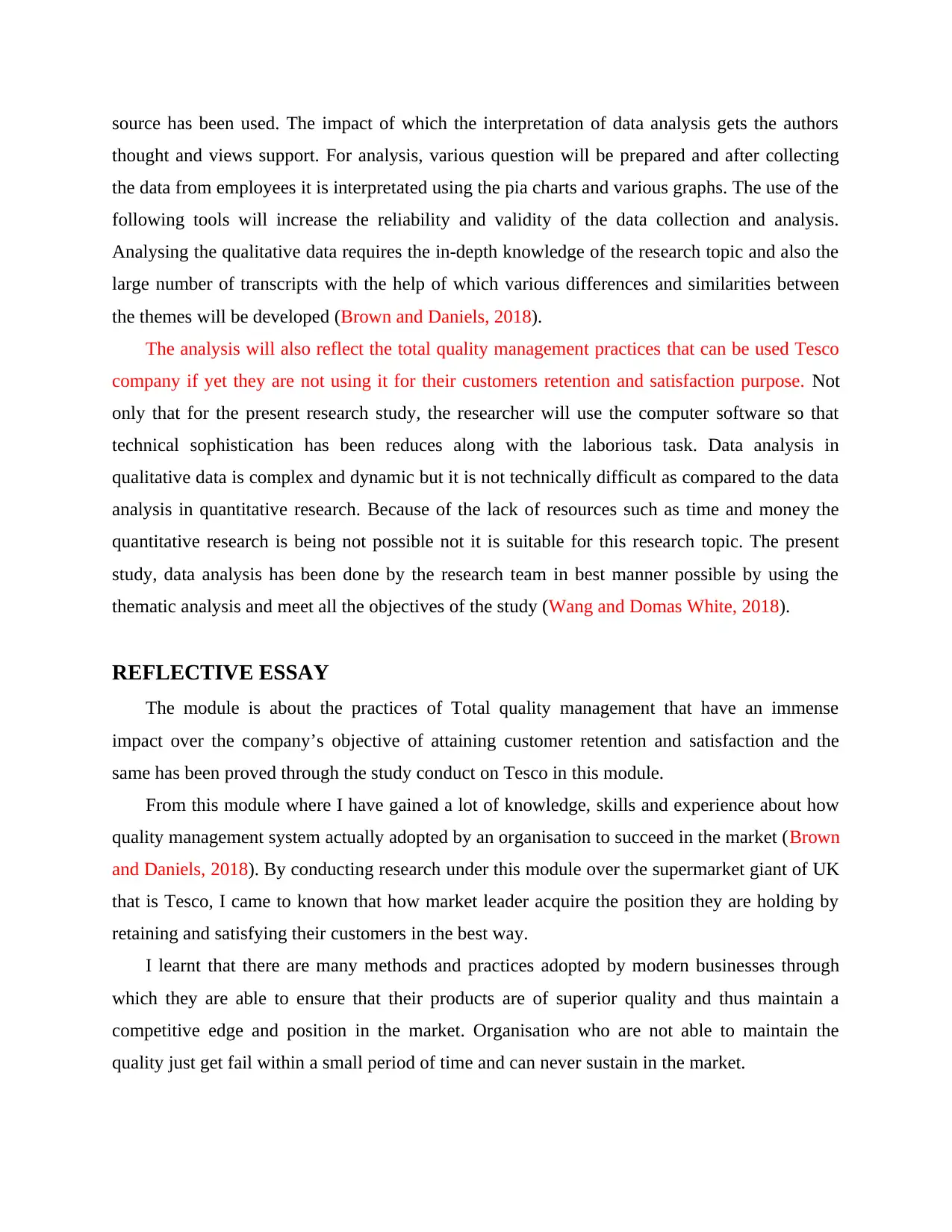
source has been used. The impact of which the interpretation of data analysis gets the authors
thought and views support. For analysis, various question will be prepared and after collecting
the data from employees it is interpretated using the pia charts and various graphs. The use of the
following tools will increase the reliability and validity of the data collection and analysis.
Analysing the qualitative data requires the in-depth knowledge of the research topic and also the
large number of transcripts with the help of which various differences and similarities between
the themes will be developed (Brown and Daniels, 2018).
The analysis will also reflect the total quality management practices that can be used Tesco
company if yet they are not using it for their customers retention and satisfaction purpose. Not
only that for the present research study, the researcher will use the computer software so that
technical sophistication has been reduces along with the laborious task. Data analysis in
qualitative data is complex and dynamic but it is not technically difficult as compared to the data
analysis in quantitative research. Because of the lack of resources such as time and money the
quantitative research is being not possible not it is suitable for this research topic. The present
study, data analysis has been done by the research team in best manner possible by using the
thematic analysis and meet all the objectives of the study (Wang and Domas White, 2018).
REFLECTIVE ESSAY
The module is about the practices of Total quality management that have an immense
impact over the company’s objective of attaining customer retention and satisfaction and the
same has been proved through the study conduct on Tesco in this module.
From this module where I have gained a lot of knowledge, skills and experience about how
quality management system actually adopted by an organisation to succeed in the market (Brown
and Daniels, 2018). By conducting research under this module over the supermarket giant of UK
that is Tesco, I came to known that how market leader acquire the position they are holding by
retaining and satisfying their customers in the best way.
I learnt that there are many methods and practices adopted by modern businesses through
which they are able to ensure that their products are of superior quality and thus maintain a
competitive edge and position in the market. Organisation who are not able to maintain the
quality just get fail within a small period of time and can never sustain in the market.
thought and views support. For analysis, various question will be prepared and after collecting
the data from employees it is interpretated using the pia charts and various graphs. The use of the
following tools will increase the reliability and validity of the data collection and analysis.
Analysing the qualitative data requires the in-depth knowledge of the research topic and also the
large number of transcripts with the help of which various differences and similarities between
the themes will be developed (Brown and Daniels, 2018).
The analysis will also reflect the total quality management practices that can be used Tesco
company if yet they are not using it for their customers retention and satisfaction purpose. Not
only that for the present research study, the researcher will use the computer software so that
technical sophistication has been reduces along with the laborious task. Data analysis in
qualitative data is complex and dynamic but it is not technically difficult as compared to the data
analysis in quantitative research. Because of the lack of resources such as time and money the
quantitative research is being not possible not it is suitable for this research topic. The present
study, data analysis has been done by the research team in best manner possible by using the
thematic analysis and meet all the objectives of the study (Wang and Domas White, 2018).
REFLECTIVE ESSAY
The module is about the practices of Total quality management that have an immense
impact over the company’s objective of attaining customer retention and satisfaction and the
same has been proved through the study conduct on Tesco in this module.
From this module where I have gained a lot of knowledge, skills and experience about how
quality management system actually adopted by an organisation to succeed in the market (Brown
and Daniels, 2018). By conducting research under this module over the supermarket giant of UK
that is Tesco, I came to known that how market leader acquire the position they are holding by
retaining and satisfying their customers in the best way.
I learnt that there are many methods and practices adopted by modern businesses through
which they are able to ensure that their products are of superior quality and thus maintain a
competitive edge and position in the market. Organisation who are not able to maintain the
quality just get fail within a small period of time and can never sustain in the market.
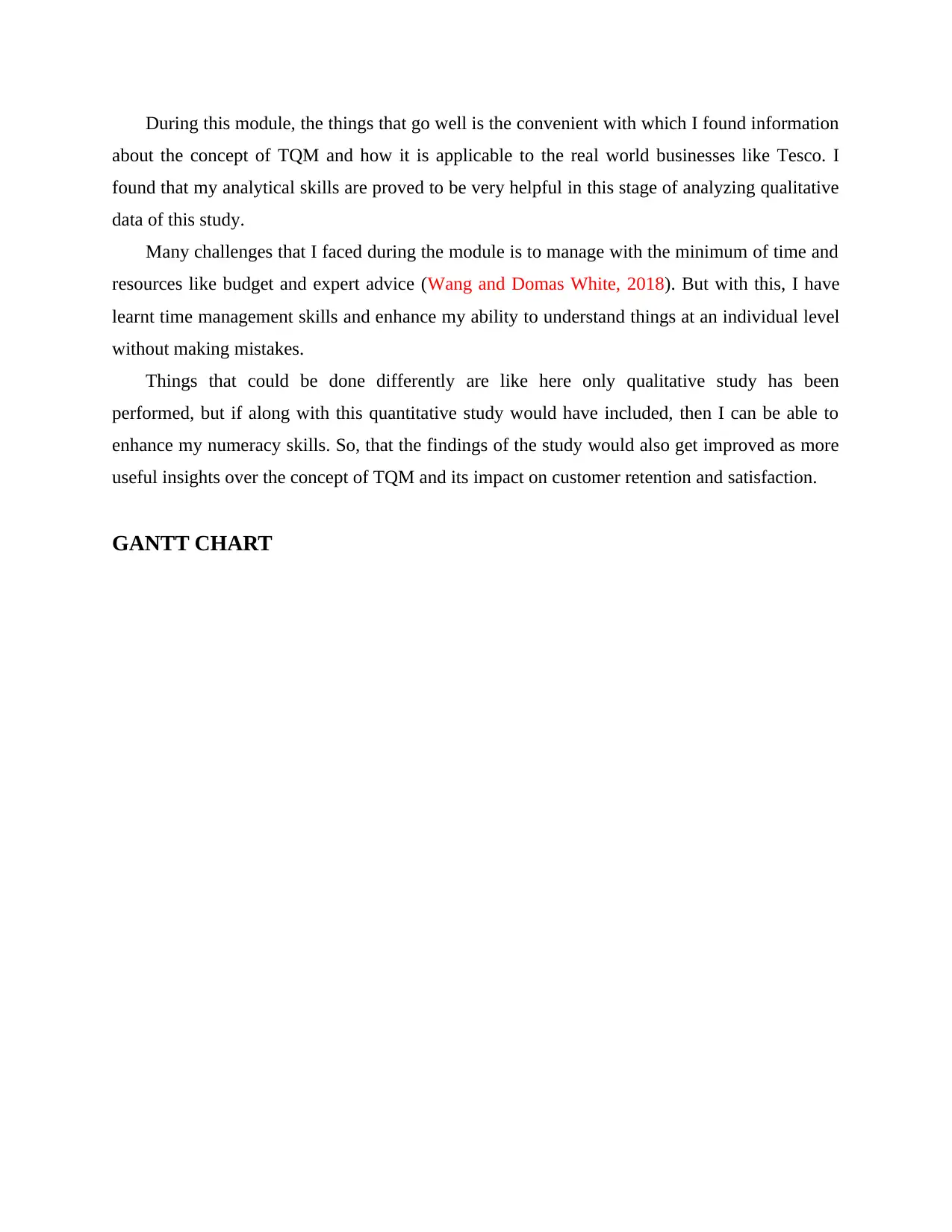
During this module, the things that go well is the convenient with which I found information
about the concept of TQM and how it is applicable to the real world businesses like Tesco. I
found that my analytical skills are proved to be very helpful in this stage of analyzing qualitative
data of this study.
Many challenges that I faced during the module is to manage with the minimum of time and
resources like budget and expert advice (Wang and Domas White, 2018). But with this, I have
learnt time management skills and enhance my ability to understand things at an individual level
without making mistakes.
Things that could be done differently are like here only qualitative study has been
performed, but if along with this quantitative study would have included, then I can be able to
enhance my numeracy skills. So, that the findings of the study would also get improved as more
useful insights over the concept of TQM and its impact on customer retention and satisfaction.
GANTT CHART
about the concept of TQM and how it is applicable to the real world businesses like Tesco. I
found that my analytical skills are proved to be very helpful in this stage of analyzing qualitative
data of this study.
Many challenges that I faced during the module is to manage with the minimum of time and
resources like budget and expert advice (Wang and Domas White, 2018). But with this, I have
learnt time management skills and enhance my ability to understand things at an individual level
without making mistakes.
Things that could be done differently are like here only qualitative study has been
performed, but if along with this quantitative study would have included, then I can be able to
enhance my numeracy skills. So, that the findings of the study would also get improved as more
useful insights over the concept of TQM and its impact on customer retention and satisfaction.
GANTT CHART
⊘ This is a preview!⊘
Do you want full access?
Subscribe today to unlock all pages.

Trusted by 1+ million students worldwide
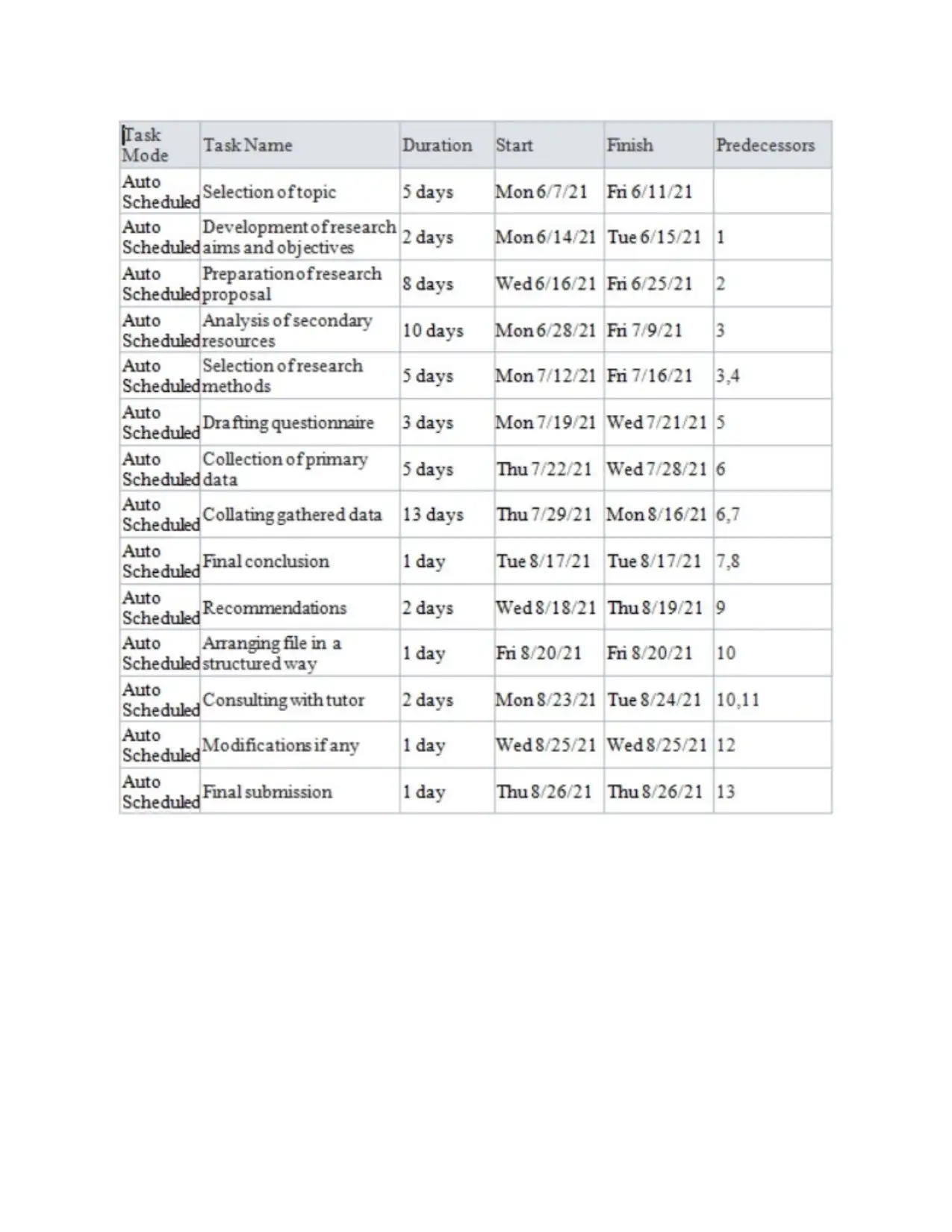
Paraphrase This Document
Need a fresh take? Get an instant paraphrase of this document with our AI Paraphraser
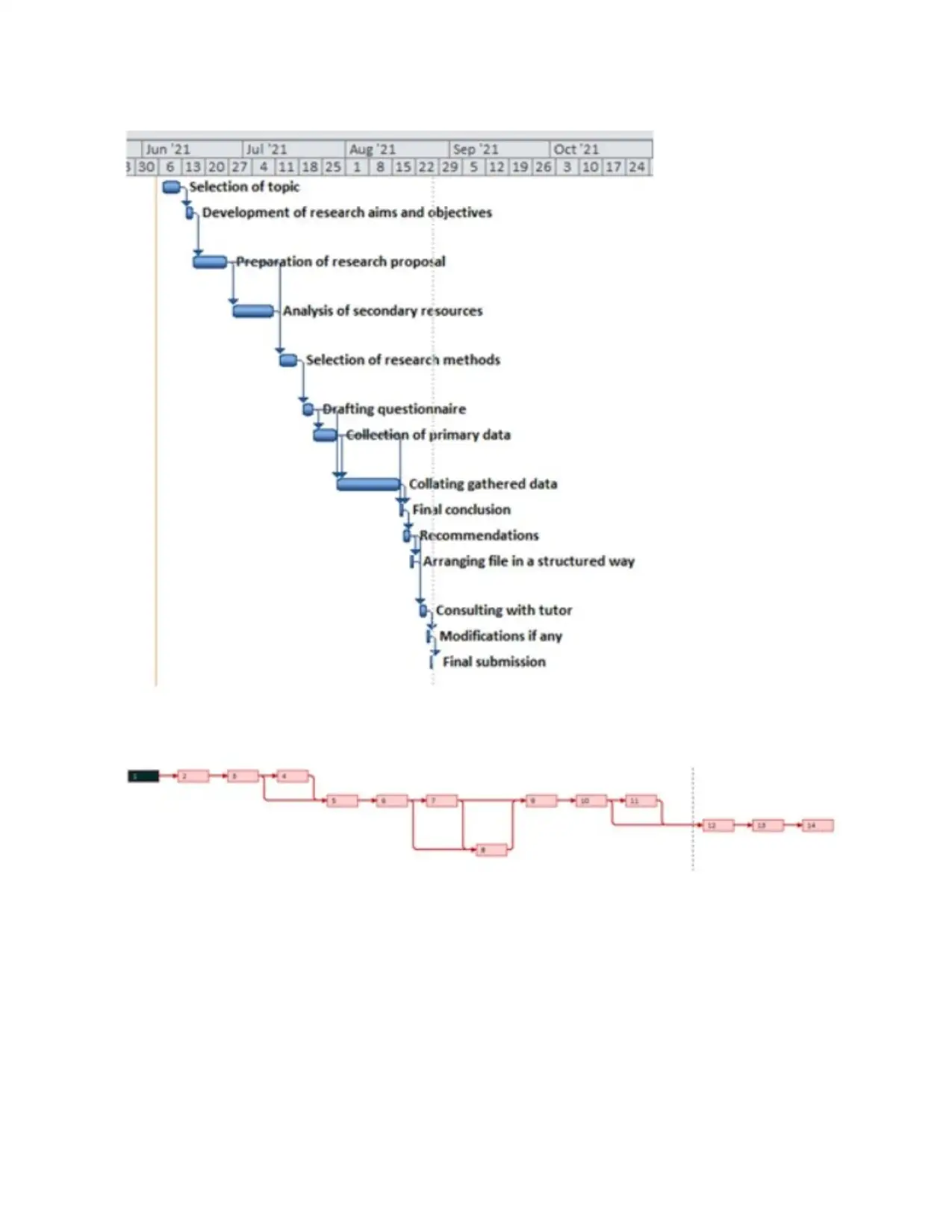

⊘ This is a preview!⊘
Do you want full access?
Subscribe today to unlock all pages.

Trusted by 1+ million students worldwide
1 out of 14
Related Documents
Your All-in-One AI-Powered Toolkit for Academic Success.
+13062052269
info@desklib.com
Available 24*7 on WhatsApp / Email
![[object Object]](/_next/static/media/star-bottom.7253800d.svg)
Unlock your academic potential
Copyright © 2020–2025 A2Z Services. All Rights Reserved. Developed and managed by ZUCOL.





